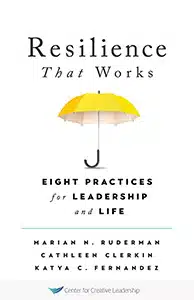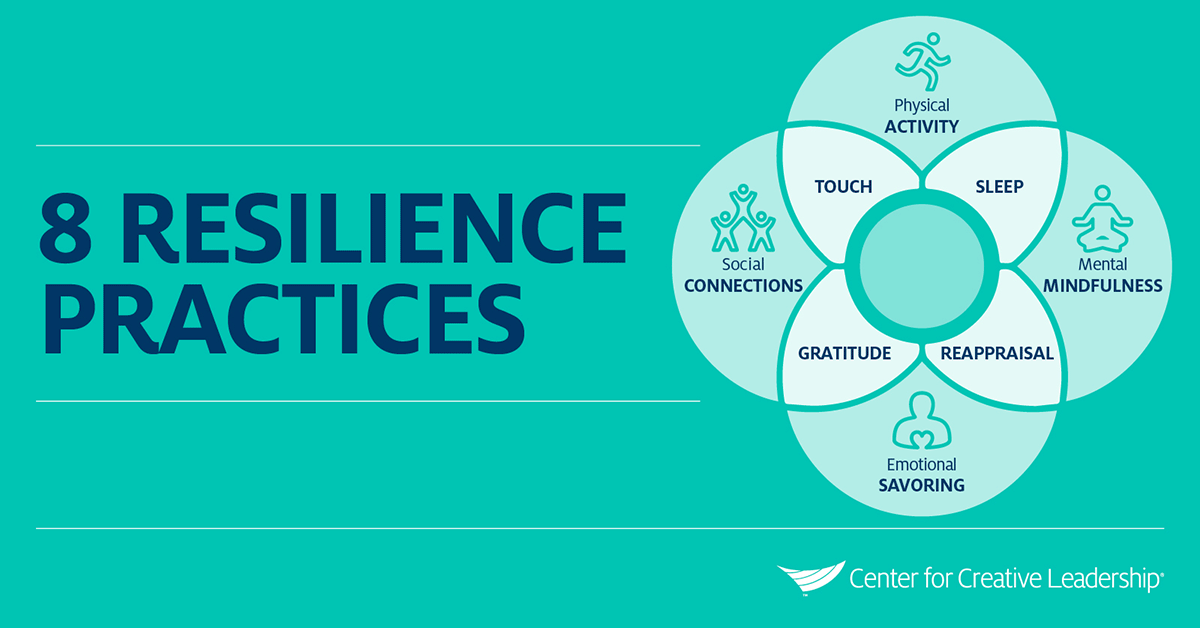How to Become a More Resilient Leader
Resilience is our ability to respond adaptively to challenges. It’s what helps us get back up again, stronger, after meeting life’s hurdles, disappointments, and failures. It’s more than simply bouncing back from adversity or not breaking in the face of hardship. Resilient leadership also includes growth.
In recent years, as we’ve all adapted to unprecedented change in our professional and personal lives, our resilience has been tested more than ever.
If you’re in a role managing others, it’s important that you are demonstrating resilient leadership for your colleagues at work. A resilient leader is one who demonstrates the ability to see failures as minor setbacks, with the tenacity to bounce back quickly and turn challenges into opportunities.
In difficult times, your team is looking to you for support and courage; they’re looking for you to set the direction and build alignment and commitment.
If you practice resilient leadership, you’ll project a positive outlook that will help others maintain the emotional strength they need to commit to a shared vision, and the courage to move forward and overcome setbacks.

Dive deeper into 8 practices that keep you healthy, focused, and functioning with our book, Resilience That Works: Eight Practices for Leadership and Life.
If your challenges are testing your ability to bounce back, there are steps you can take to help you become a more resilient leader who can thrive. By modifying your thoughts and actions, you can change your views, habits, and responses towards more resilient leadership. Not only will that help to broaden your own outlook, but it will also inspire your team to become more adaptable and resilient, too.
A Framework for More Resilient Leadership
As noted in our white paper, we believe that building resilience is a whole-self endeavor, involving a leader’s body, thoughts, feelings, and behaviors. Our researchers developed the following framework for building resilient leadership.
4 Core Areas of Resilient Leadership
- Physical resilience is the body’s capacity to respond to stressors with strength and stamina, as well as recover from injury.
- Mental resilience is the ability to maintain or regain cognitive capacities that risk degradation and to allow creativity to emerge.
- Emotional resilience centers on understanding, appreciating, and regulating emotions, and consciously choosing feelings and responses, rather than simply automatically reacting to the environment.
- Social resilience reflects an individual’s capacity to work with others to endure and recover from stressors.
Each of these 4 areas is vital to helping a leader respond to challenging situations and each contributes to an individual’s sense of flourishing, life satisfaction, and wellbeing. It’s important to note that these 4 areas are interwoven, overlapping, and mutually reinforcing — and resilient leadership itself is in the center, strengthened and reinforced by each area.
8 Practices for Resilient Leadership
To become a more resilient leader and grow in each of the 4 core areas, focus on the following 8 resilient leadership practices:
1. Increase Physical Activity.
In addition to lowering your blood pressure and cholesterol, we know that regular exercise improves your ability to process stress and simultaneously makes your leadership more resilient and effective. Learn more about how exercise is linked to leadership effectiveness.
2. Get Enough Sleep.
Detaching from work and making time for the recommended 7-8 hours of sleep each night is scientifically proven to strengthen resilient leadership. Learn more about how sleep makes you a stronger leader.
3. Boost Mindfulness.
Whether you’re celebrating success or enduring hardship, make time for mindfulness. Mindfulness fosters learning, new perspectives, and a degree of self-awareness that can enhance your resilience and build resilient leadership.
Access Our Webinar!
Watch our webinar, How to Promote Wellbeing at Work, and learn how to build a workplace culture that supports and promotes wellbeing for all employees.
4. Challenge Your Assumptions.
Learn to notice and challenge potentially faulty assumptions about what others are thinking and doing — a process known as “cognitive reappraisal.” Our perceptions are more likely to become distorted and/or irrational when we’re under stress; in many cases, they become oversimplifications of the situation that may not be accurate. When you challenge these assumptions, you can arrive at more productive (and less stressful) beliefs. Learn more about the power of self-talk when leading through difficult times.
5. Savor the Sweet Things.
Deliberately enhance and prolong your positive moods, experiences, and emotions by intentionally savoring them. Consciously savoring the good things in life is important because neuroscience research suggests that our brains have a negativity bias, so leaders must be intentional about reaching for positivity in order to enhance resilient leadership. Learn more about how to maximize joy through savoring.
6. Practice Gratitude.
Take time to acknowledge and appreciate small things throughout your day. The more purposeful you are about practicing gratitude, the more things will naturally trigger a feeling of thankfulness. Giving thanks will actually make you a better leader.
7. Build Social Connections.
Develop and nurture a broad network of personal and professional relationships. Of course, having strong relationship skills at work is important for achieving business outcomes and meeting professional goals, but personal relationships matter too, and can provide the types of support you need for the work-life juggle. Both types of social connections are critical in helping you deal with hardships and in developing perspective. Remember that strong social connections matter for building resilient leadership on your team, too.
8. Engage Your Senses, Including Touch.
When we think of engaging our senses, we often forget about our sense of touch. But engaging in some types of physical contact can be a simple and effective way to reduce anxiety and stress. Because touching at work is not as relevant for hybrid and remote teams, and can be inappropriate and/or misunderstood in a work context, this resilience practice is best implemented in your personal life, where you can share contact with supportive people and snuggle with pets. Even brief positive touches, such as a fist bump or a high-five, can contribute to increased wellbeing.
Together, these 8 resilient leadership practices will make you a happier, more successful person, both as a leader at work and as an adaptable, future-ready individual.
Ready to Take the Next Step?
Empower your team to develop more resilient leadership and habits that create conditions for peak performance with our resilience-building solutions, which will help your leaders avoid burnout — and burn bright instead.












